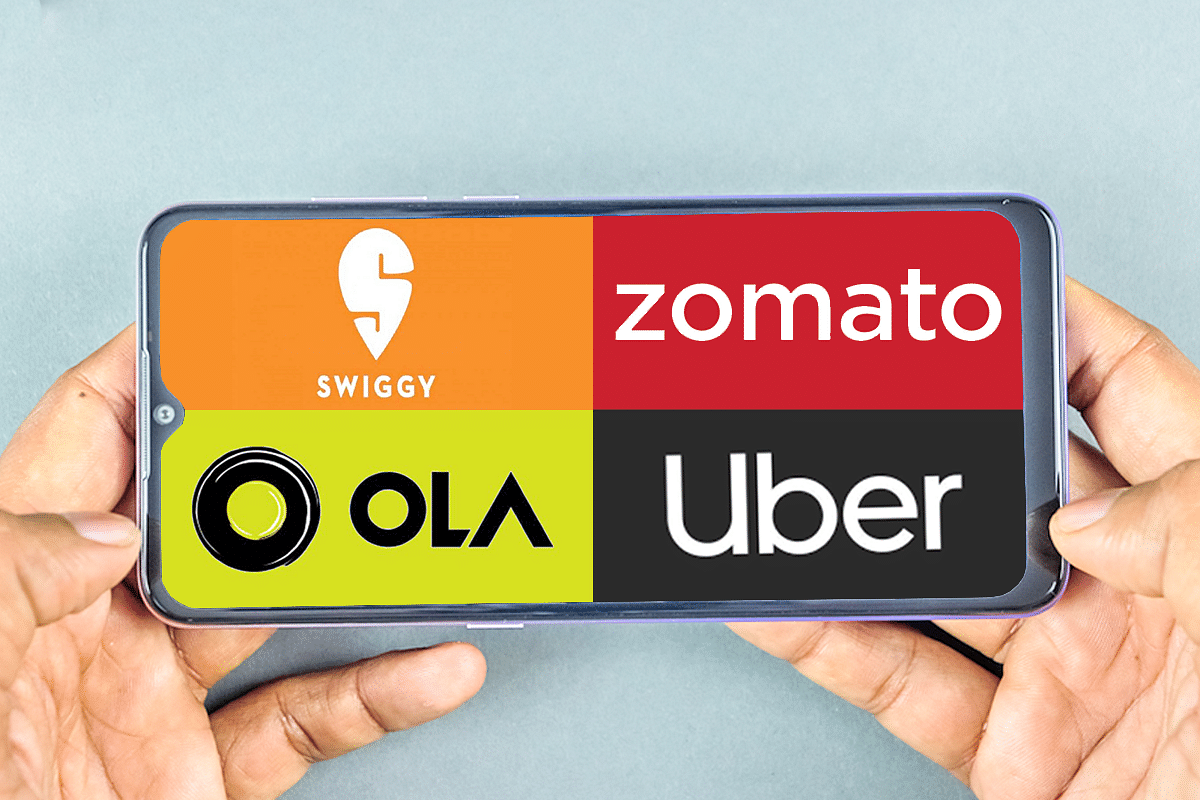News Brief
SC Sends Notices To Centre, Ola, Uber, Swiggy, Zomato On PIL Seeking Social Security For Gig Workers
- The Indian Federation of App-based Transport (IFAT) workers had filed a petition seeking social security benefits for gig and platform workers employed by online companies.
- In response, SC issued notices on the case to the centre and four app-based operators—Ola, Uber, Swiggy, and Zomato—and posted the matter after four weeks.

Swiggy, Zomato, Ola and Uber
The Supreme Court on 13 December issued notice in response to the public interest litigation (PIL) seeking social security benefits for gig and platform workers employed by online companies such as Ola, Uber, Swiggy and Zomato.
In the service sector, a gig worker acts as an independent contractor or freelancer, while a platform worker is linked with an organisation that provides specific services to individuals or organisations directly through an online platform. Platform workers include Ola or Uber drivers and Swiggy or Zomato delivery agents.
The Indian Federation of App-based Transport (IFAT) workers filed a petition seeking social security benefits for all unorganised workers. On 13 December, a bench of justices L Nageswara Rao and BR Gavai issued notices on the case to the centre and four app-based operators—Ola, Uber, Swiggy, and Zomato—and posted the matter after four weeks.
Senior advocate Indira Jaising, appearing for the litigants before a bench of Justices Rao and Gavai, referred to a recent judgement by the Supreme Court of the United Kingdom, which ruled that the parties' relationship was actually that of an employer and employee, regardless of any contracts signed between them.
“We seek a declaration that the drivers or delivery workers are actually workmen in the classical sense of the word. Worldwide for Uber they have been considered as workers. The UK Supreme Court analysed the contract (between Uber and the employee) that this is only a subterfuge and the real relationship is that of employee and employer," Jaising added.
She argued that they should be considered as unorganised workers under the Unorganised Workers Social Security Act, 2008, and should be eligible for all social security benefits. She said that failing to do so was a violation of their constitutional rights to labour, livelihood, as well as equality and opportunity.
Workers were significantly affected by the pandemic, and incomes were substantially impacted. They were unable to maintain themselves due to a lack of social security benefits. The PIL asked the court to help them get through tough times and return EMIs to banks and financial institutions by awarding them workers' rights.
The petitioners are seeking a judgement that gig workers are entitled to protection as "unorganised workers" even under existing rules, according to Jaising.
These legislations include The Workmen’s Compensation Act, 1923; The Employee’s State Insurance Act, 1948; The Industrial Disputes Act, 1947; Employee’s Provident Funds and Miscellaneous Provisions Act, 1952; The Payment of Gratuity Act, 1972; The Maternity Benefit Act, 1961 and ‘Unorganized Workers’ Social Welfare Security Act, 2008.
The petition stated that the Code on Social Security, 2020 was enacted by Parliament to modify and consolidate existing social security laws and to expand the benefits provided by those laws to all employees and workers in the organised and unorganised sectors.
This code included a separate chapter on social security for unorganised workers, gig workers, and platform workers—which was approved by the President in September 2020 but has yet to be implemented.
The petition said: “The failure of the state to register them as ‘unorganized workers’ or to provide them social security under the existing law is violation of their rights under Article 21 of the Constitution of India, namely—the right to work, the right to livelihood; right to decent and fair conditions of work. It is also a denial of the right to equality before law and equal protection of laws."
In light of the foregoing, petitioners have requested monetary payments of Rs 1175 per day for app-based drivers and Rs 675 per day for everyone else till 31 December, or until the pandemic is over.
The PIL also requested that directions be issued to financial institutions, banks, or NBFC not to seize and/or auction vehicles of App-Based Workers for failure to pay EMI's on their loans until the pandemic is over and that financial institutions be penalised for failing to comply with the directions issued in RBI Circulars and the Supreme Court's decision titled, Small Scale Industrial Manufacturers Association v Union of India, LL 2021 SC 175.
The matter will be heard by the court in January 2022.
Introducing ElectionsHQ + 50 Ground Reports Project
The 2024 elections might seem easy to guess, but there are some important questions that shouldn't be missed.
Do freebies still sway voters? Do people prioritise infrastructure when voting? How will Punjab vote?
The answers to these questions provide great insights into where we, as a country, are headed in the years to come.
Swarajya is starting a project with an aim to do 50 solid ground stories and a smart commentary service on WhatsApp, a one-of-a-kind. We'd love your support during this election season.
Click below to contribute.
Latest